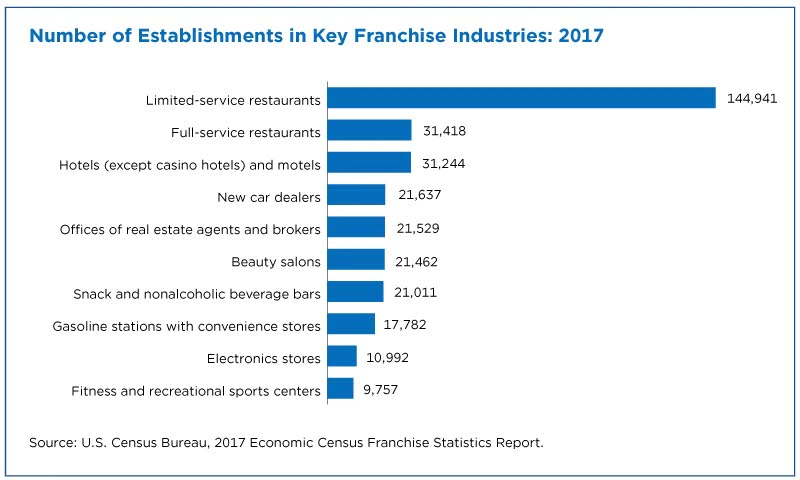Buying a Franchise Business? A Legal Overview of the Franchising Relationship

Why is franchising important? According to the U.S. Census Bureau Report (2017 Economic Report), 11.4% of all businesses are franchises. Franchises are present in 295 countries with over 498,000 locations. There are over 9.5 million workers employed by franchises and the annual economic output in the US is over 1.7 trillion dollars. This article provides a legal overview of the franchise relationship, a business structure that has a massive impact on the United States and World’s economy.
How Does a Franchise Work?
A franchise is an agreement between a franchisor and franchisee granting the franchisee the right to sell services or goods under the franchisor’s business plan, including using the franchisor’s name (or symbol) in exchange for a fee. Typically, this fee includes an initial franchise payment and ongoing royalties based on revenues. Franchises work best when the two main parties, the franchisor and the franchisee, communicate honestly and are fully knowledgeable of each other’s rights and responsibilities. The franchise agreement provides the foundation for this dialogue and relationship.
The Franchisor
The franchisor is the person or entity who creates and owns the business concept and intellectual property. They trademark their brand and provide that trademark, a business system or marketing plan, and training regarding operations, to the franchisee. In exchange, the franchisor collects a royalty.
There are many reasons a business may choose to franchise. For one, expansion is expensive. Instead of spending its own capital, which it may not have, by franchising, a brand can often expander quicker by relying on the capital and skills that franchisees bring. The franchise relationship also allows both parties to utilize different strengths. While the franchisor creates an idea and marketing strategy, the franchisee focuses on operating responsibilities and managing employees.
The Franchisee
The franchisee is often a first-time business owner. They provide money or capital to open a location, often through small business administration-backed loans, conventional loans, or investors. The amount of support given to franchisees varies significantly by brand, but the franchisor commonly trains the franchisee on business operations and provides support with finding a location, design and construction, financing, and marketing.
Advantages to Franchising for the Franchisee
Franchisors and franchisees receive significant benefits from franchising. For one, franchising teaches people with no prior experience how to become business owners. And it gives them the idea and business plan for operating the business. For someone coming from a corporate background who may not yet have the next great business idea, it’s a path to business ownership. In stronger brands, there is also substantial brand loyalty resulting in customers recognizing the brand and leading to business organically. And good franchise systems help struggling franchisees recognize what is not working and put them on a path to success.
Disadvantages to Franchising for the Franchisee
There are some disadvantages to consider—the biggest being the ongoing royalty fees owed to the franchisor, which otherwise might be franchisee profits. These fees for some brands exceed 10% of revenue. While the franchisee may be getting a return on its investment with the fees paid into the marketing fund the remaining royalties may become an ongoing cost without any corresponding benefit. Also, franchisors exercise a lot of control. They regulate new ideas, prices, logos, and overall décor. Franchisees cannot deviate from the system standards and if they come up with a new idea or concept within the same system, they will need to hand it over to the franchisor. They often require buying from specific suppliers who pay the franchisor’s rebates (or kickbacks). This can limit the suppliers the franchisee works with and in some situations cause the franchisee to pay above market prices for supplies.
Important Franchise Documents
How do you go about buying a franchise? Well, it starts with receiving some heavy documentation. The three most significant franchise documents are the franchise disclosure document, the franchise agreement, and the operations manual. The franchise disclosure document discloses comprehensive information about the franchise required under various states laws and the Federal Trade Commission’s (FTC) Franchise Rule. The franchise agreement is a legal document that controls the franchise relationship, and the operations manual tells franchisees how to operate the franchise.
What’s in the Franchise Disclosure Document:
The franchise disclosure document or FDD for short is broken down into 23 items. Each item contains important information to be disclosed about the franchise system. Brief overviews of each item are provided below:
- Item 1 – The franchisor and any parents, predecessors, and affiliates. Describes other companies affiliated with the brand, and this reveals whether it’s part of a multi-brand company and whether affiliates supply products or services to the franchisees. This item will also identify the industry’s applicable laws and how long the franchisor has been operating.
- Item 2 – Business experience. Discloses executives’ business backgrounds, including how long they have been in their roles. A lot of turnover is a red flag.
- Item 3 – Litigation. Discloses litigation involving alleged fraud or unfair business practices. A lot of recent litigation is a red flag.
- Item 4 – Bankruptcy. Discloses whether the franchisor, affiliates, or key executives have declared bankruptcy.
- Item 5 – Initial fees. Describes the initial franchise fees required to pay the franchisor.
- Item 6 – Other fees (ongoing royalties, ad fee, technology, etc.) Describes other fees you must pay the franchisor, such as royalties on revenue, the ad fee, technology, training, and others.
- Item 7 – Estimated initial investment. Describes startup costs and the capital needed to operate the franchise over the first 3 – 6 months (most franchisors show a 3 month estimate of costs).
- Item 8 – Restrictions on sources of products and services – Discloses the relationship between the franchisor and the suppliers. If the franchisor makes significant money from the franchisees’ suppliers, this can be a red flag as prices charged to the franchisee for those products or services may be above market.
- Item 9 – Franchisee’s obligations. Includes an overview of the franchisee’s obligations, but the operations manual contains a more detailed description.
- Item 10 – Financing. Some franchisors offer to finance the initial franchise fee or the initial expenses.
- Item 11 – Franchisor’s assistance, advertising, computer systems and training. Review the training to ensure its sufficient to learn to operate the business.
- Item 12 – Territory. Indicates whether the territory is exclusive, non-exclusive, or otherwise protected. If exclusive, this section will tell you how large the territory is. No exclusivity can mean you will face competition from other franchisees or the company itself.
- Item 13 – Trademarks. This section indicates whether the brand has protected trademarks. If there is litigation regarding the validity of the trademark, that is a red flag.
- Item 14 – Patents, copyrights, and proprietary information. Identifies any patents, copyrights and proprietary information.
- Item 15 – Obligation to participate in the actual operation of the franchise business. Describes whether you can be a passive owner or whether you must actively participate in the business.
- Item 16 – Restrictions on what the franchisee may sell. Franchisees are typically restricted in the products and services that can be offered.
- Item 17 – Renewal, termination, transfer, and dispute resolution. Lays out requirements to renew or transfer your franchise and what grounds the franchisor would have to terminate.
- Item 18 – Public figures. Confirms whether a celebrity associated with a brand has ownership in it.
- Item 19 – Financial performance representations Franchisors may (but don’t have to) describe the performance of franchisees. If the franchisor has been around for at least 2 years and does not disclose that information, it’s a red flag.
- Item 20 – Outlets and franchisee information Details how many franchisees and company-owned outlets are operating in each state and the changes over the last three years. A lot of terminations or reacquisitions can be a red flag.
- Item 21 – Financial Statements. Franchisors are required to provide audited financial statements describing their performance and financial health.
- Item 22 – Contracts. Identifies agreements associated with the franchise agreement
- Item 23 – Receipts. After signing a receipt acknowledging you received the franchise disclosure document, you must wait at least 14 days to sign the franchise agreement.
How are Franchising Documents Regulated?
The FTC, the nation’s consumer protection agency, requires that franchisors provide prospective franchise owners with a franchise disclosure document. The FTC identifies what a franchisor must disclose to a franchisee in this document. Still, the FTC does not review the documents, approve their contents, or typically bring any enforcement actions against franchisors who do not include required items in the franchise disclosure document.
Additionally, thirteen of fifty states are franchise registration states: California, Hawaii, Illinois, Indiana, Maryland, Michigan, Minnesota, New York, North Dakota, Rhode Island, Virginia, Washington, and Wisconsin. State regulators or examiners in these states review franchise disclosure documents to ensure the inclusion of all required items. However, the level of review can very substantially and no one is verifying the accuracy of any statement in the franchise disclosure document. For the other states—no one in government is reviewing the FDD for accuracy or completeness.
What about the Franchise Agreement?
While the FDD discloses information about the franchise system and its history, the franchise agreement is the legal document that describes the franchisor and franchisee’s respective contractual obligations. Although these agreements are typically very one-sided they can vary as to how heavy handed they are. For example, does the franchisor give you a chance to cure (or fix) various issues that come up or does the franchisor have a right to automatically terminate. This distinction can be the difference between keeping your franchise or losing it. The franchise agreement also typically incorporates the obligations contained within the operations manual. The operations manual lays out in further detail how the franchise is to be operated from the look of the buildout to the hours it should be operating to what products or services must be offered.
Recommended Steps to Buying a Franchise
Due diligence is imperative when considering a franchise. Is your prior experience and personality a good fit for the franchise? Are you okay with the franchisor having a lot of control and say in running your business? Are franchisees succeeding in the system and is it a growing business? As part of your due diligence, consider reaching out to franchisees and hiring an attorney who knows franchise law.
Talk to as Many Current and Former Franchisees as Possible
The franchise disclosure document contains contact information for both current and former franchisees. Contact them, visit franchise locations, learn about the business, and research their competitors. Ask them about the pros, cons, and hidden costs.
Hire an Attorney who Knows Franchise Law
An expert in franchise law and legal issues understands the complexity of franchise relationships. From reviewing franchise documents, negotiating terms, and solving problems, an experienced attorney can help you reach your business goals.
Work With an Experienced Franchise Lawyer
Challenges arise whether you are just getting started or own and operate an established franchise. It’s essential to have an attorney who understands the complex franchising relationship and can successfully solve legal issues. If you need an experienced franchise lawyer, contact Luther Lanard, PC, to schedule a consultation.


